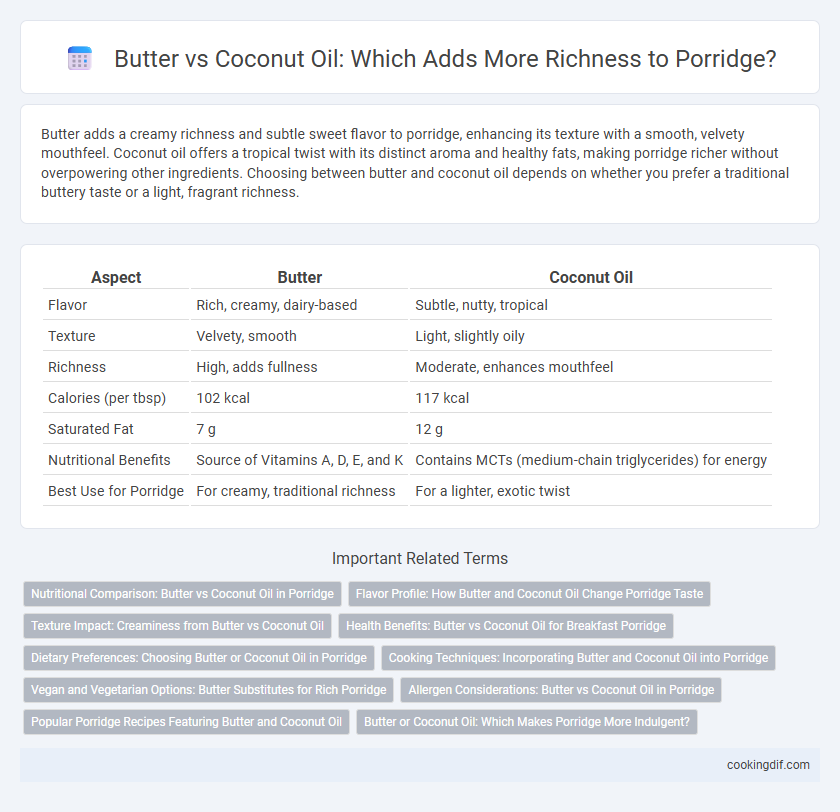Butter adds a creamy richness and subtle sweet flavor to porridge, enhancing its texture with a smooth, velvety mouthfeel. Coconut oil offers a tropical twist with its distinct aroma and healthy fats, making porridge richer without overpowering other ingredients. Choosing between butter and coconut oil depends on whether you prefer a traditional buttery taste or a light, fragrant richness.
Table of Comparison
| Aspect | Butter | Coconut Oil |
|---|---|---|
| Flavor | Rich, creamy, dairy-based | Subtle, nutty, tropical |
| Texture | Velvety, smooth | Light, slightly oily |
| Richness | High, adds fullness | Moderate, enhances mouthfeel |
| Calories (per tbsp) | 102 kcal | 117 kcal |
| Saturated Fat | 7 g | 12 g |
| Nutritional Benefits | Source of Vitamins A, D, E, and K | Contains MCTs (medium-chain triglycerides) for energy |
| Best Use for Porridge | For creamy, traditional richness | For a lighter, exotic twist |
Nutritional Comparison: Butter vs Coconut Oil in Porridge
Butter adds rich, creamy texture to porridge with higher saturated fats and fat-soluble vitamins A, D, E, and K, supporting immune and eye health. Coconut oil, rich in medium-chain triglycerides (MCTs), enhances porridge with quick energy and may boost metabolism while offering antioxidant properties through lauric acid. Choosing between butter and coconut oil depends on desired nutritional benefits: butter provides fat-soluble vitamins and a creamy taste, whereas coconut oil offers metabolic and antimicrobial advantages with a lighter feel.
Flavor Profile: How Butter and Coconut Oil Change Porridge Taste
Butter imparts a creamy, rich flavor with subtle caramel and nutty undertones, enhancing porridge's traditional comfort taste. Coconut oil adds a tropical, slightly sweet aroma with a hint of nuttiness, giving porridge an exotic twist. Both fats improve texture and mouthfeel, but butter enriches with dairy warmth while coconut oil delivers a lighter, fragrant richness.
Texture Impact: Creaminess from Butter vs Coconut Oil
Butter imparts a rich, velvety creaminess to porridge due to its saturated fat content and dairy butterfat, enhancing mouthfeel and smooth texture. Coconut oil contributes a slightly silky texture with a lighter, tropical richness, offering subtle coconut undertones without the heaviness of butter. The choice between butter and coconut oil affects porridge texture by balancing creaminess and flavor intensity according to personal preference.
Health Benefits: Butter vs Coconut Oil for Breakfast Porridge
Butter provides a creamy texture and contains fat-soluble vitamins A, D, E, and K, which support immune function and bone health. Coconut oil is rich in medium-chain triglycerides (MCTs) that can boost metabolism and provide quick energy, making it a popular choice for enhancing porridge richness without raising cholesterol. Choosing between butter and coconut oil depends on dietary goals, with butter favored for vitamin content and coconut oil for its potential metabolic benefits.
Dietary Preferences: Choosing Butter or Coconut Oil in Porridge
Butter enhances porridge richness with its creamy texture and high saturated fat content, appealing to those preferring traditional dairy fats. Coconut oil, rich in medium-chain triglycerides (MCTs), offers a dairy-free option favored by vegan and lactose-intolerant individuals seeking a tropical flavor profile. Selecting between butter and coconut oil depends on dietary restrictions, flavor preferences, and desired nutritional benefits in porridge preparation.
Cooking Techniques: Incorporating Butter and Coconut Oil into Porridge
Incorporating butter into porridge enhances its richness through slow melting, creating a creamy texture as the fat emulsifies with the starches. Coconut oil, when stirred in just before serving, imparts a tropical aroma and adds a subtle, silky mouthfeel without overpowering the natural grains. For optimal flavor infusion, melting butter into hot porridge allows for deeper integration, whereas coconut oil benefits from gentle warming to preserve its delicate flavor compounds.
Vegan and Vegetarian Options: Butter Substitutes for Rich Porridge
Coconut oil offers a rich, creamy texture to porridge while aligning perfectly with vegan and vegetarian diets, providing a dairy-free alternative to traditional butter. Rich in healthy fats, coconut oil enhances porridge with natural sweetness and a subtle tropical flavor, boosting its nutritional profile without compromising taste. Substituting butter with coconut oil supports plant-based lifestyles and delivers a decadent mouthfeel for a satisfying, wholesome breakfast.
Allergen Considerations: Butter vs Coconut Oil in Porridge
Butter contains dairy proteins that are common allergens, making it unsuitable for individuals with lactose intolerance or milk allergies, while coconut oil is free from dairy and generally hypoallergenic. Coconut oil provides a rich, creamy texture without introducing common allergens, making it a safer choice for those with milk sensitivities. Choosing coconut oil over butter enhances porridge richness while catering to allergen considerations, ensuring a wider range of dietary needs are met.
Popular Porridge Recipes Featuring Butter and Coconut Oil
Butter enhances porridge richness by adding creamy texture and a slightly nutty flavor, making it a staple in traditional recipes like Irish or Scottish oatmeal. Coconut oil offers a tropical twist with subtle sweetness and a smooth mouthfeel, popular in vegan or dairy-free porridge variations such as banana-coconut or pumpkin-coconut porridge. Recipes featuring butter often highlight savory toppings, while coconut oil pairs well with fruits, spices, and plant-based ingredients for a vibrant, nutrient-rich breakfast.
Butter or Coconut Oil: Which Makes Porridge More Indulgent?
Butter enhances porridge richness with its creamy texture and natural dairy fats, providing a smooth, indulgent mouthfeel and a subtle, comforting flavor. Coconut oil adds a tropical twist, contributing medium-chain triglycerides that create a lighter richness and a slightly sweet, nutty aroma. Choosing butter typically results in a more decadent porridge experience, while coconut oil offers a unique richness with added health benefits.
Butter vs Coconut oil for porridge richness Infographic

 cookingdif.com
cookingdif.com